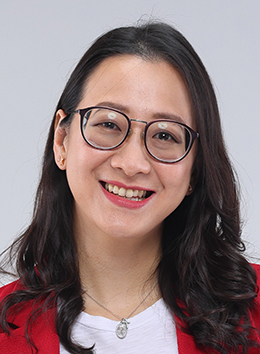Rhea Patricia LIEM

Telephone Number
Office
Links
Google Scholar
ORCID
Scopus ID
Contact Information
Telephone Number
Office
Links
Google Scholar
ORCID
Scopus ID
Research Interests
Biography
Prof. Liem obtained her Bachelor of Engineering degree from the School of Mechanical and Production Engineering, Nanyang Technological University. Her undergraduate study was supported by the Association of Southeast Asian Nations (ASEAN) with a 4-year merit-based full scholarship. She earned Master of Science (S.M.) degrees in Computation for Design and Optimization (supported by the Singapore-MIT Alliance Fellowship Award), and Aeronautics/Astronautics, from the Massachusetts Institute of Technology (MIT). She then pursued her PhD degree in the Multidisciplinary Design Optimization (MDO) Laboratory, University of Toronto Institute for Aerospace Studies (UTIAS), as a Vanier Canada Graduate Scholar. She is also a 2012 Amelia Earhart Fellow.
Prof. Liem's main research interest is in aerospace computation, specifically in the application of computational science and advanced computing capabilities to solve real-world problems in aircraft design and air transportation. At present, aerospace computation has gone beyond the computational fluid dynamics (CFD) and computational structural mechanics (CSM). One prominent example is the application of constrained optimization techniques to meet the desired design objective in aircraft design process, such as minimum drag, fuel burn, or structural weight. Using intensive computation for simulation and optimization allows researchers and practitioners to model and examine phenomena that are too complex, costly, or hazardous for experimentation, and thus address problems previously deemed intractable. Computational science also makes it possible to analyze the interdependency of processes across disciplinary boundaries. In this regard, multidisciplinary design and optimization (MDO) aims to assist the design analyses and optimizations of any complex systems while accounting for the interdisciplinary coupling within the system. MDO is therefore deemed suitable for the analysis and design processes of a system as complex as aircraft. The vast availability of data allows us to further improve our models to make them closer to reality. Our group has also explored data-enhanced modeling techniques, especially for air transportation applications (fuel burn, noise, and air traffic modeling).
Research Interests
Biography
Prof. Liem obtained her Bachelor of Engineering degree from the School of Mechanical and Production Engineering, Nanyang Technological University. Her undergraduate study was supported by the Association of Southeast Asian Nations (ASEAN) with a 4-year merit-based full scholarship. She earned Master of Science (S.M.) degrees in Computation for Design and Optimization (supported by the Singapore-MIT Alliance Fellowship Award), and Aeronautics/Astronautics, from the Massachusetts Institute of Technology (MIT). She then pursued her PhD degree in the Multidisciplinary Design Optimization (MDO) Laboratory, University of Toronto Institute for Aerospace Studies (UTIAS), as a Vanier Canada Graduate Scholar. She is also a 2012 Amelia Earhart Fellow.
Prof. Liem's main research interest is in aerospace computation, specifically in the application of computational science and advanced computing capabilities to solve real-world problems in aircraft design and air transportation. At present, aerospace computation has gone beyond the computational fluid dynamics (CFD) and computational structural mechanics (CSM). One prominent example is the application of constrained optimization techniques to meet the desired design objective in aircraft design process, such as minimum drag, fuel burn, or structural weight. Using intensive computation for simulation and optimization allows researchers and practitioners to model and examine phenomena that are too complex, costly, or hazardous for experimentation, and thus address problems previously deemed intractable. Computational science also makes it possible to analyze the interdependency of processes across disciplinary boundaries. In this regard, multidisciplinary design and optimization (MDO) aims to assist the design analyses and optimizations of any complex systems while accounting for the interdisciplinary coupling within the system. MDO is therefore deemed suitable for the analysis and design processes of a system as complex as aircraft. The vast availability of data allows us to further improve our models to make them closer to reality. Our group has also explored data-enhanced modeling techniques, especially for air transportation applications (fuel burn, noise, and air traffic modeling).
